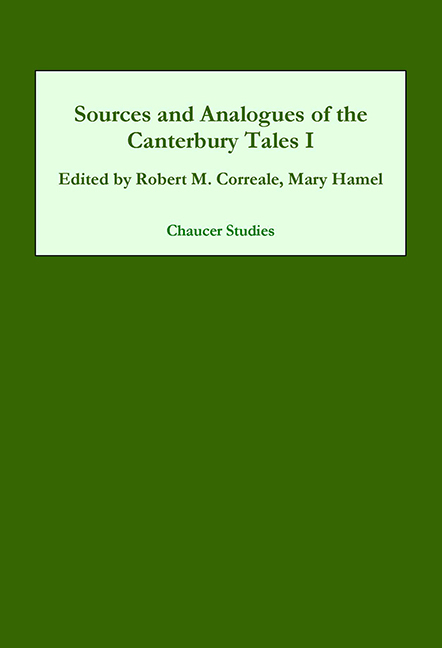Book contents
- Frontmatter
- Contents
- preface
- Acknowledgements
- The Frame
- The Reeve's Tale
- The Cook's Tale
- The Friar's Tale
- The Clerk's Tale
- The Squire's Tale
- The Franklin's Tale
- The Pardoner's Prologue and Tale
- The Tale of Melibee
- The Monk's Tale
- The Nun's Priest's Tale
- The Second Nun's Prologue and Tale
- The Parson's Tale
- Contributors and editors
- General Index
- Index of Manuscripts
The Frame
Published online by Cambridge University Press: 25 October 2017
- Frontmatter
- Contents
- preface
- Acknowledgements
- The Frame
- The Reeve's Tale
- The Cook's Tale
- The Friar's Tale
- The Clerk's Tale
- The Squire's Tale
- The Franklin's Tale
- The Pardoner's Prologue and Tale
- The Tale of Melibee
- The Monk's Tale
- The Nun's Priest's Tale
- The Second Nun's Prologue and Tale
- The Parson's Tale
- Contributors and editors
- General Index
- Index of Manuscripts
Summary
The Canterbury Tales is a framed story-collection, a form that originated in the East, was adopted with enthusiasm in the medieval West, and that reached its peak of popularity in European literature in the fourteenth century. In the Tales, the frame takes the form of a pilgrimage with the pilgrims as storytellers, and the tales are told in competition with each other; both these elements have sources and analogues of their own that are independent of the generic nature of the whole work as a collection of tales. In addition, the relationships established between the stories as they pick up related themes and motifs from each other, sometimes from adjacent tales, sometimes from more distant ones, is a process that interlocks with the frame of the work but that also has much in common with debate, itself a widespread literary form but also found much more widely in medieval culture.
This survey of sources and analogues will attempt to cover all four of these areas – story-collections and how they organize their constituent tales; debate; poetic contests; storytelling pilgrims – to give some idea of the origins of the large structures of the whole work. The problems attendant on such a survey are rather different from those for the individual tales. There are works that we know from other evidence that Chaucer read, and that may have set him thinking – as the articulation of the stories within Ovid's Metamorphoses, for instance, may have done – but that do not offer models for the solutions he himself adopted; there are others that offer closer parallels to Chaucer's solutions but where the clinching evidence that would prove direct debt has been in dispute, Boccaccio's Decameron being the most striking instance. Specific topics of debate, such as pro- and antifeminism, can be thoroughly documented as they occur in sections of the Tales such as the Wife of Bath's Prologue; but Chaucer's informing principle of structuring his story-collection by analogy with a series of dialectical debating positions derives from more general conventions of debate literature, and from the wider usages of disputation in medieval culture, in the law courts, the schools, Parliament and so on, where specific source texts are beside the point.
- Type
- Chapter
- Information
- Publisher: Boydell & BrewerPrint publication year: 2002



